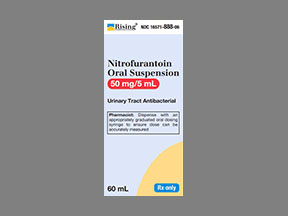
Nitrofurantoin Coupons & Savings Card – Discount Prices from $1500.13
Nitrofurantoin, also known as Macrobid, is an antibiotic prescribed for the treatment and prevention of urinary tract infections (UTIs). It functions by accumulating in the urine and targeting bacteria in the urinary tract. This is achieved by disrupting or inhibiting the proteins essential for bacterial survival, effectively stopping their growth. It is crucial to note that Nitrofurantoin is specifically for bacterial infections and is ineffective against viral infections like the flu or common cold.
This medication should not be administered to infants under one month old and is not suitable for treating infections outside the bladder, such as kidney infections. While generally safe with few drug interactions, possible side effects include nausea, headache, and gas, as well as a dark yellow or brown discoloration of the urine. A more affordable generic version of Nitrofurantoin is available. Always consult a healthcare professional for advice tailored to your health needs before starting any new medication.
Our coupons are free to use. Before paying, show the pharmacist your Nitrofurantoin savings card to get your free discount. Use our filters below to edit the prescription box to match your needs. The Nitrofurantoin prices will update based on your prescription needs. Above our Nitrofurantoin coupons, you can change your location to see pharmacy prices and costs in other areas. We're here to help you buy Nitrofurantoin at the lowest price with our prescription discount card.
My prescription
Edit
60ML of 50MG/5ML, Nitrofurantoin (1 Bottle)
Select pharmacy

CVS
$1500.13
COUPON PRICE
Walgreens
$2603.07
COUPON PRICE
Walmart
$2698.00
COUPON PRICE
Albertsons
$2831.90
COUPON PRICENitrofurantoin savings card
Show this card to your pharmacist
CVS
$1500.13
BIN
ID
PCN
GRP
019876
LHF90FEBA7
CHIPPO
LHX
Powered by
Nitrofurantoin, also known as Macrobid, is an antibiotic prescribed for the treatment and prevention of urinary tract infections (UTIs). It functions by accumulating in the urine and targeting bacteria in the urinary tract. This is achieved by disrupting or inhibiting the proteins essential for bacterial survival, effectively stopping their growth. It is crucial to note that Nitrofurantoin is specifically for bacterial infections and is ineffective against viral infections like the flu or common cold.
This medication should not be administered to infants under one month old and is not suitable for treating infections outside the bladder, such as kidney infections. While generally safe with few drug interactions, possible side effects include nausea, headache, and gas, as well as a dark yellow or brown discoloration of the urine. A more affordable generic version of Nitrofurantoin is available. Always consult a healthcare professional for advice tailored to your health needs before starting any new medication.
Our coupons are free to use. Before paying, show the pharmacist your Nitrofurantoin savings card to get your free discount. Use our filters below to edit the prescription box to match your needs. The Nitrofurantoin prices will update based on your prescription needs. Above our Nitrofurantoin coupons, you can change your location to see pharmacy prices and costs in other areas. We're here to help you buy Nitrofurantoin at the lowest price with our prescription discount card.
More prescriptions for urinary tract infection
coupons from$27.72Save 86%
coupons from$4.79Save 95%
coupons from$120.90Save 78%
coupons from$37.93Save 84%
coupons from$37.03Save 62%
coupons from$223.90Save 88%
coupons from$4.93Save 82%
coupons from$262.20Save 64%
More prescriptions for urinary tract infection
Methenamine Mandelate Save 86%coupons from $27.72
Ciprofloxacin Hcl Save 95%coupons from $4.79
Minocycline ER Save 78%coupons from $120.90
Cefadroxil Save 84%coupons from $37.93
Monurol Save 62%coupons from $37.03
Sulfadiazine Save 88%coupons from $223.90
Erythromycin Save 82%coupons from $4.93
Invanz Save 64%coupons from $262.20
Nitrofurantoin Anhydrous (Nitrofurantoin) dosage forms
Use our Nitrofurantoin Anhydrous (Nitrofurantoin) 60ML of 50MG/5ML coupon with prices from $1500.13 for 1 Bottle. You can also use our Nitrofurantoin Anhydrous (Nitrofurantoin) 60ML of 50MG/5ML coupon with prices from $2981.96 for 2 Bottles. We have a Nitrofurantoin Anhydrous (Nitrofurantoin) 60ML of 50MG/5ML coupon with prices from $4463.80 for 3 Bottles. You can use our Nitrofurantoin Anhydrous (Nitrofurantoin) 230ML of 25MG/5ML coupon with prices from $293.29 for 1 Bottle.
Dosage Quantity Price from Per unit 60ML of 50MG/5ML 1 Bottle $1500.13 $1500.13 60ML of 50MG/5ML 2 Bottles $2981.96 $1490.98 60ML of 50MG/5ML 3 Bottles $4463.80 $1487.93 230ML of 25MG/5ML 1 Bottle $293.29 $293.29 230ML of 25MG/5ML 2 Bottles $568.28 $284.14 230ML of 25MG/5ML 3 Bottles $843.26 $281.09
| Dosage | Quantity | Price from | Per unit |
|---|---|---|---|
| 60ML of 50MG/5ML | 1 Bottle | $1500.13 | $1500.13 |
| 60ML of 50MG/5ML | 2 Bottles | $2981.96 | $1490.98 |
| 60ML of 50MG/5ML | 3 Bottles | $4463.80 | $1487.93 |
| 230ML of 25MG/5ML | 1 Bottle | $293.29 | $293.29 |
| 230ML of 25MG/5ML | 2 Bottles | $568.28 | $284.14 |
| 230ML of 25MG/5ML | 3 Bottles | $843.26 | $281.09 |
